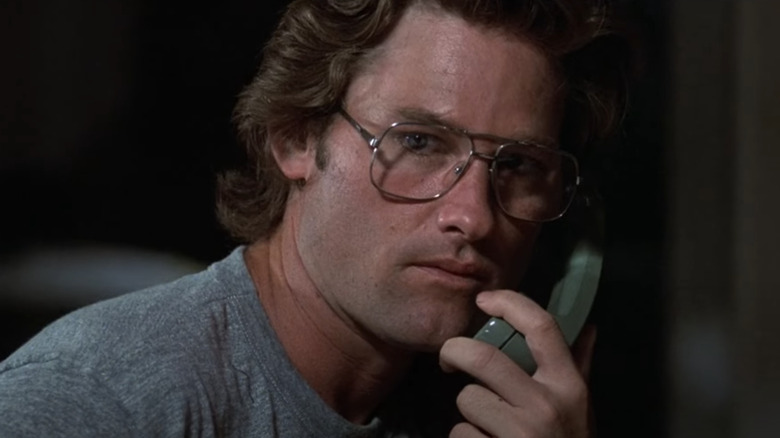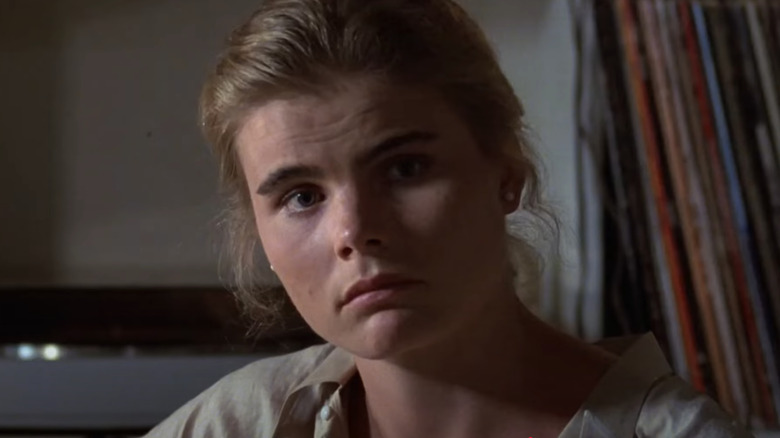Kurt Russell's Twisted Crime Thriller Predicted Our Love For True Crime
Why are we so fascinated by the true crime genre? It seems morbid curiosity is, to some degree, responsible for its soaring popularity, raising uneasy questions about the ethics of perceiving such subject matter as entertainment. On the flip side, there's the psychological complexity of it all, which also highlights how vulnerable we truly are. The fact that anyone can be exposed to such extreme criminality is a sobering realization, as well as something that's been leveraged by streamers such as Netflix to churn out all kinds of sensationalized projects.
Turning real-life trauma into semi-fictionalized stories will always be a slippery slope, but I guess there is some value in bringing awareness to toxic attitudes responsible for certain crimes. A good example of this measured approach is Netflix's "Adolescence," which uses real-life crime statistics to examine misogyny among a certain demographic within a fictional setting.
The roots of true crime can be traced back to mid-1920s genre magazines, which recounted crimes in snazzy snippets. However, it wasn't until decades later that the 1990s saw a sudden boom in true crime media, especially in Hong Kong. At the same time, a boom suggests that the genre existed in multiple mediums and had already gained some kind of prominence. If we turn our attention to the U.S., then we need to acknowledge the gory, suspenseful nonfiction book that helped establish the genre. Indeed, Truman Capote's 1965 work "In Cold Blood" popularized true crime stateside by creating a niche that would go on to become all the rage in the years that followed. But between Capote's prototypical book and the rapid influx of true crime works post-2014, there was a 1985 crime thriller that anticipates our current obsession with the genre.
Directed by Phillip Borsos, "The Mean Season" doesn't depict its chilling story from the perspective of an amateur true crime obsessive. Rather, the film makes us privy to the stressful inner life of Miami-based crime reporter Malcolm Anderson (Kurt Russell), who feels terribly exhausted and burnt out after covering the most heinous crimes in the city. Just when he decides to take a step back, though, Malcolm is sucked into an especially grisly murder case that blurs the lines between his personal involvement and his professional status as an objective bystander.
The Mean Season is an intelligent and prescient thriller about true crime
Spoilers for "The Mean Season" to follow.
When Malcolm gets involved in another murder case, he approaches it as merely another routine investigation that calls for fact-based, competent newspaper reporting (the kind that helps pay his bills). However, the serial killer in question, Alan Delour (Richard Jordan), makes an unexpected move: He chooses Malcolm to serve as his mouthpiece and uses him to announce his next intended victims as part of a sick cat-and-mouse game with the frustrated police and media. While these kinds of fame-obsessed killers are not unheard of, Jordan brings an eeriness to Alan, who takes on an unsettlingly soft-spoken demeanor while talking to Malcolm on the phone. Alan is drawn to Malcolm's cold intellect as a reporter who notices things others overlook, while the latter develops a morbid fascination with the killer who has cherry-picked him out of hundreds.
Malcolm has complicated motivations as well, as his involvement with Alan is much more intimate than his everyday assignments as a reporter. There's an advantage to being the only person who can tell the rest of the world more about Alan's sinister mind, as Malcolm can essentially create any narrative that sells. Over time, though, Malcolm comes to realize that Alan is not the only one addicted to fame, as our once-burned-out reporter suddenly feels rejuvenated by the prospect of being noticed. Those around him, like his girlfriend Christine (Mariel Hemingway), believe that Malcolm will eventually do the right thing, but that doesn't prevent them from anxiously worrying about his state of mind. But above all else, "The Mean Season" asks an essential question: What are the chances a reporter will actually stick to their ethics when a sensational byline is within reach?
"The Mean Season" is not perfect by any means, as parts of the story make for a poor imitation of what newspaper reporting is like in real life (or, at least, what it was like in '85). Not to mention, Hemingway's Christine is written as a stereotypical nagging girlfriend — one whose valid concerns are presented as nitpicks and a hindrance to Malcolm's quest. Once we overlook these aspects, though, the film's story feels taut and clever, with its focus being on the relationship between true crime and its increasingly unhealthy public consumption. By the time Malcolm crosses the very line he should have been defending, it's a little too late for him.

